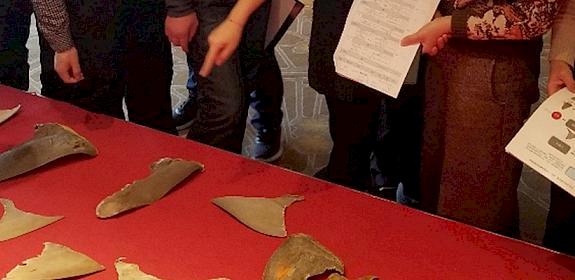Training programme in India helps officials fight back against cybercrime
Ramnagar, Uttarakhand, 26-27th December 2018—TRAFFIC’s India Office, in partnership with WWF-India, National Tiger Conservation Authority (NTCA) and the Police Radio Training School (PRTS), Indore, held a training workshop for forest officials to build capacity for dealing with wildlife related cybercrime.
The two-day workshop the first of its kind in the country, was attended by 39 officials from the two tiger-bearing states of India and was held at Laldhang, in the Corbett Tiger Reserve in Uttarakhand.
Illegal wildlife trade is one of the most significant threats facing natural biodiversity, with illegal traders increasingly shifting to online markets.
The growing networks of poachers, traders, and consumers operating on digital channels is presenting a growing challenge to law enforcement. Until recently, agencies tasked with detecting wildlife cybercrime in India have employed traditional monitoring protocols, with varying degrees of success.
The demand for wildlife commodities on social media and e-commerce platforms is contributing to a surge in poaching and illegal wildlife trade. TRAFFIC and WWF are spearheading efforts to counter this, in part through understanding and devising effective methods to monitor illegal activity on virtual markets.
The training workshop in Corbett was conducted by experts in monitoring cybercrime. Topics included sessions on intelligence, investigation, and search and seizure techniques; communication device investigation; social media investigation; cybercrime scene management; digital intelligence collection; wildlife forensics; telecom surveillance and CDR analysis and IPDR – (CDR of IP address) analysis.
The training team was led by Dr Saket Badola, Head of TRAFFIC India and Mr. Varun Kapoor, Additional Director General, Madhya Pradesh Police and included Mr. Sudeep Goenka, Superintendent of Police, Cyber Cell, Bhopal; Mr. Malay Mahant, Incharge Training: PRTS Indore; and Mr. Afzal Khan, Incharge Technical Cell, PRTS Indore.
The workshop was the first in the series being organised under a new flagship programme called “Cyber CLAW”. Similar training programmes are being arranged for forest officials of other Tiger Reserves.
After completing the two-day training programme, five candidates from each Tiger Reserves will be selected for the next phase of the programme which includes five-day comprehensive hands-on training in combatting wildlife cybercrime. Techniques will include in-depth training on website and email investigation, Open Source Intelligence Collection (OSINT), financial trail analysis, and darknet investigations.
Cyberspace is fast emerging as a major platform for trading in illegal wildlife parts and derivatives. With an estimated 281 million internet users in India, various social media platforms have turned into virtual markets where illegal wildlife trade is being carried out.
Dr Saket Badola, Head of TRAFFIC's India Office
Commonly traded protected wildlife species on digital channels in India include Red Sand Boa; pangolin; turtles and tortoises; Tokay Geckos; parakeets and owls; corals and shells; timber species; cobra venom; monitor lizards’ parts and derivatives among other wildlife.
Mr. Varun Kapoor said, “With consumers moving on to using virtual markets for their day to day requirements, the level of cybercrime has increased. Reports indicate that there is almost one cybercrime committed every 10 minutes in India. Wildlife cybercrime is burgeoning and if left unaddressed can have devastating impact on India’s wildlife. It is our mission to provide adequate knowledge and skills to the officials of these workshop on dealing with various aspects of wildlife cybercrime”.
Mr. Rahul, Director of Corbett Tiger Reserve spoke to the participants about various modern tools including drones and GPS being used in patrolling to protect wildlife. He highlighted that wildlife cybercrime has emerged as a huge challenge for wildlife law enforcers today as poachers and wildlife traders are using modern communication mediums for promoting their illegal business.
Mr. Surender Mehra, Chief Conservator of Forest (Wildlife administration, protection and intelligence) Uttarakhand also emphasised on an urgent need to equip forest departments with modern tools and techniques to combat wildlife cybercrime in the state. He highlighted that the initiative taken by TRAFFIC along with other partners will provide adequate knowledge and skills that can be used by a forester to combat wildlife cybercrime in the state.
WWF

WWF is an independent conservation organization, with over 30 million supporters and a global network active in over 100 countries. WWF's mission is to stop the degradation of the Earth's natural environment and to build a future in which humans live in harmony with nature, by conserving the world's biological diversity, ensuring that the use of renewable natural resources is sustainable, and promoting the reduction of pollution and wasteful consumption. Visit www.panda.org/news for the latest news and media resources and follow us on Twitter @WWF_media.




